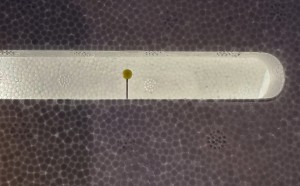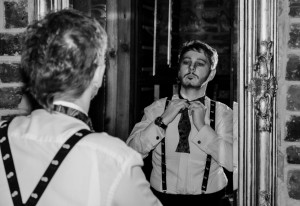“Artists should be in cities and cities need artists…” Introducing: Paradise Works, Salford
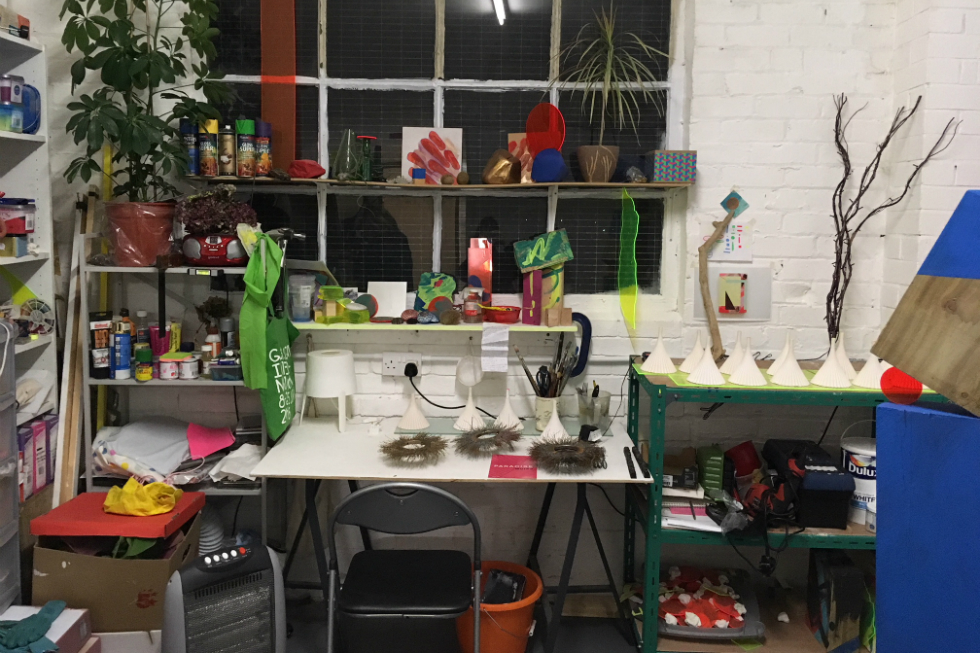
Laura Robertson speaks to Hilary Jack about what it’s taken to establish a brand new art space on the Manchester-Salford border – slap-bang in the middle of a major studio crisis…
My Uber driver initially drives straight past Paradise Works – we swoop into a nearby close, shadowed by tower blocks. It’s dark and we both peer out of the windows, looking for a pink sign on the intersection of East Philip Street and Bridgewater Street. Back tracking, a smiling woman flags us down. It’s Hilary Jack: artist and co-founder of this new art studio complex and gallery.
The paint’s still fresh as Jack takes me on a tour: up red stairs (each step is emblazoned with the words “AMBITION”, “VERITY”, “WISDOM” – an artwork by Cherry Tenneson) and onto 12,000 sq ft of spacious, bright workspaces. Home to 28 new members, Paradise Works leases studios to a mix of recent graduates from BA or MA, and more established artists who have a career of ten years or more. There’s ex-Castlefield Gallery director Kwong Lee, who’s flitting between Manchester and Hong Kong (“Kwong is our first honorary member”, says Jack. “We offered him a free space because he’s done so much for the regional art scene, we wanted to give something back and we hope the studio will allow him the time and space to return to his practice as an artist”); designers Winter and Kurth, whose marquetry is part of the permanent collection at Manchester Art Gallery; and Liverpool Biennial Associate Artist Nina Chua, who’s currently collaborating with New York-based writer and curator Rotem Rozental.
Then there’s film/sound/print artist Elliott Flanagan, who graduated this year and won a studio and mentoring bursary. James Ackerley graduated in 2013, and has organised a mad, bright exhibition of recent graduates entitled Sexy Boy Unites Salford. It’s part of a critically engaged programme instigated by Ackerley; inviting young artists to show, curate and critique their own work. There’s a radical, feminist, Queer art project and space on the top floor, The Penthouse, founded and ran by artists Rosanne Robertson and Debbie Sharp. It’ll be open for a film night on Friday 1 December to mark World Aids Day. The inaugural exhibition, Politics of Paradise, is set up in a new gallery with a kinetic entrance-way designed by Winter and Kurth: charcoal grey beams sway from side to side as you walk through. The group show, curated by Jack, Kieran Leach and Kwong Lee and featuring studio members, asks some pertinent questions about where they are and how they got here – responding to their location and the utopian vision often attributed to artists communities.
Jack’s chilly studio space has newly installed shelves for objects and pot plants, a big work table covered in pens and books, and enough floor space to assemble and test out ideas. You can see twinkly city lights through her window. Jack is a widely exhibited artist (having been included in a recent blockbuster show at Compton Verney and awarded the Spinningfields Art Commission 2016, amongst others) and curator, collaborating for years on the well-known Apartment exhibition space, set up in Paul Harfleet’s one-bedroom council flat in Manchester from 2004-09 . Paradise Works is her current focus: opening the doors in April 2017, just 12 months after she and co-founder Lucy Harvey viewed the building. Their big October launch included parties in the studios and a booth at Manchester Contemporary, City Mayor of Salford Paul Dennett in attendance, and opening speeches from the building’s owner, Urban Splash co-founder Tom Bloxham, and the Arts Council. Artists have chipped in to transform the interior from empty warehouse to studio complex, as well as curating and exhibiting work in Politics of Paradise, and designing that hot-pink branding. When I’m there, there’s loads of plastic sheeting over the project space as Urban Splash are fixing the roof.
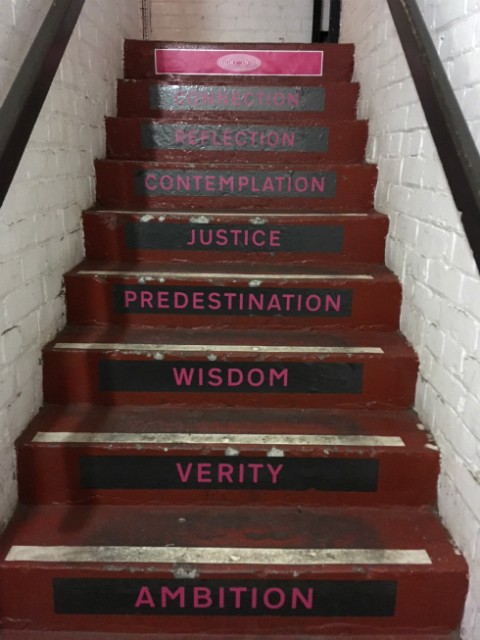
It is, by all first impressions, a slice of paradise. “It’s a great little spot”, says Jack. “It feels very much like the edge of the city and the start of something else. In the area, there’s Islington Mill, Caustic Coastal, Artwork Atelier, Hotbed Press, Paper and Mirabel, and us. The city’s coming out towards us; were going to be engulfed at some point.”
I agree. A three-storey chunk of red brick, Paradise Works is squashed between the River Irwell and Manchester’s major ring road, Trinity Way. It’s a very short walk from Manchester Arena and Victoria Train Station, which gives the uninitiated a sense of Salford’s proximity to Manchester; they sometimes feel like part of the same place. If you work here, it’s more than likely you’ll walk across the city boundaries in order to travel home. You’ll also be familiar with these red brick ex-mills, dotted across post-industrial plots and a reminder of booming Victorian trade. Some have been demolished, yet a few remain nestled amongst newer builds: Paradise Works is itself in a large housing estate, including 1960s high rises which have recently been refurbished. But more on that later. This is an area earmarked for development, and one which is acutely attractive to young professionals working in either city. It is also an area that might potentially be drawn into the emotive process of gentrification.
There’s no doubt in Jack’s mind that such a crisis drove Paradise Works into being so quickly: a crisis of swiftly-disappearing studio provision. A former resident of Rogue Studios, one of Manchester’s oldest not-for-profit artist workspaces, Jack was involved since she graduated in 1995. Rogue had occupied Crusader Mill behind Piccadilly Train Station since 2000, before property developers Capital & Centric purchased it in December 2015 with an eye on turning it into flats. They evicted Rogue’s 97 artists, plus the neighbouring 3rd Floor Studios and five textile companies. About 50 of Rogue’s artists have since acquired new premises at a former school, Varna Street Primary in Openshaw, and some of the rest have moved into Paradise Works.
“There were several artist-led spaces being evicted earlier this year [who] joined us, including Ny Space, who were given just two weeks by Bruntwood to leave. There were many artists groups in Hotspur under threat for a long time, at the same time as Rogue. We took the lease on here in April, and they were evicted in March. There were four or five artists who moved in before the units were even built. Cherry Tenneson was in a Stockport studio and was evicted. Then just a few weeks ago, The Penthouse’s building was sold to a foreign investor. It’s just happening so quickly in Manchester; so many buildings are being torn down or changed into apartments.”
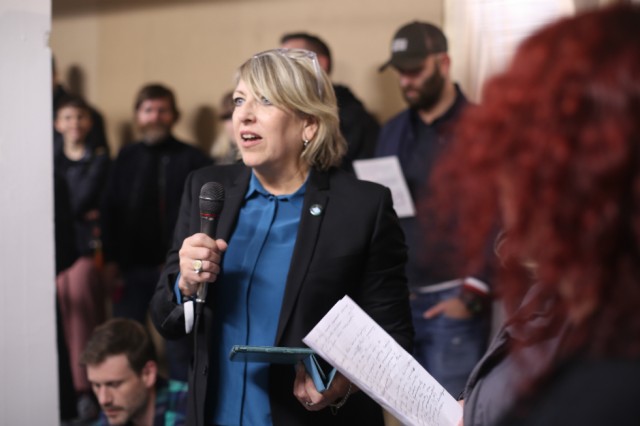
It’s a story you’ll have heard before, highlighting the precarious nature of artists’ studios – artists often struggle to find affordable workspaces, and when they do, they are often rented on short-term leases with no long-term security – in addition to the artist’s objectionable role as cultural capital. Or as ex-Rogue and new Paradise Works member Louise Giovanelli put it to us last year: “It seems that artists move into a place, make it cool and desirable, then they get chased out and people want to live in the cool area where the artists are… but [they’re] not there anymore because you’ve chased them out. It’s bizarre.”
Jack and I discuss the studio crisis in Manchester, and as a bigger problem across the UK. The London Assembly released a report earlier this year, entitled Creative tensions: optimising the benefits of culture through regeneration, which predicted that approximately 3,500 of the capital’s artists will lose their studios by 2019, or 30% of the current provision. Increased rent as a result of gentrification affects artists as they are among the lowest earners – typically £10,000 per annum – in a city where culture accounts for one in six jobs. It’s incredibly frustrating and acutely detrimental to artistic practice. After all, without affordable, safe, and secure studios for its producers, how is Britain expecting to remain one of the world’s best exporters of arts and culture?
Salford’s cultural plans are certainly ambitious in this context: its place-marking as a ‘Production City’ of sorts is intended to boost its creative and economic growth on a national and international stage. Last year, a £1bn expansion of Salford Quays was approved by the local council, which will include more TV studio and production space for the BBC and others at MediaCity. Also in 2016, Salford-based arts organisation and NPO Walk the Plank were granted £500,000 by Arts Council England to build new premises in the area, whilst the nearby University of Salford unveiled a shiny new School of Arts and Media. It’s not a huge leap for Salford’s leaders to recognise that production spaces for artists are required in order for their creative ecosystem to function well, in addition to retaining all those graduates and London-expats.
Bloxom got it: inviting Jack and a small group of artists in 2016 to discuss studio provision. “He felt very much that artists should be in cities and cities need artists.” Whilst unable to find a building in his portfolio suitable for Rogue, a space which had formerly been The Biospheric Project – part of Manchester International Festival, 2013 – was lying empty. But there was a problem with the lease – it was in someone else’s hands. “And it just bugged me”, says Jack. “I thought it’d be great for artists; it’s in a great location, looks good, is the right size. I managed to get hold of the person who had the lease; it took a few months but we got it. Urban splash supported us through that. I just knew it was the right thing to do and that maybe I was the right person to negotiate it, somehow.”
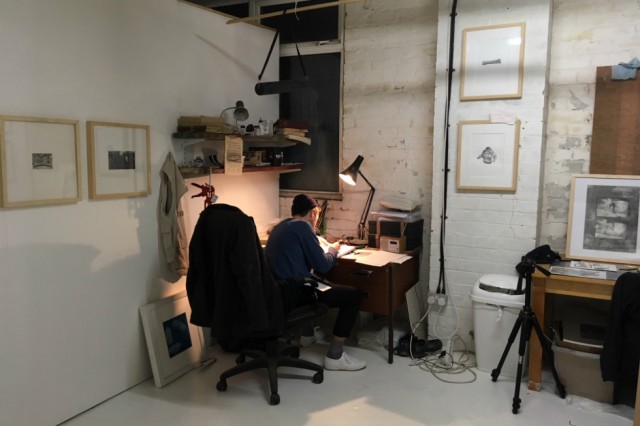
A longer lease is to be agreed in the New Year, and it is hoped by all involved that Paradise Works will experience a different trajectory: one that will resist the effects of gentrification whilst positioning artists at the heart of the city’s cultural growth as a permanent, not temporary, fixture. “In Salford, there is a Cultural Strategy team”, says Jack. “We have been welcomed with open arms by the University, the Council. The Mayor really gets it – how we must have artists at the centre of things, how we don’t want to be moving around all the time, or to be told: ‘Thanks a lot, you’ve regenerated this area and kept that building nice and safe, now move on and do the same down the road’.”
Regeneration has happened here to a large extent before Jack got the keys. Urban Splash’s new Irwell Riverside town houses are on one side; “what a proper neighbourhood should be”, according to their website. They resemble little grey Lego houses with primary coloured panels, and are apparently fully kitted out with integrated smart tech for heating and lighting. Urban Splash have their head office down the road in Castlefield, Manchester; this is just one tiny part of “over a billion pounds in regeneration” investment and “over 5,000 new homes and 2 million square foot of work space” that they’ve been involved in since 1993.
On the other side are Greyfriar Court, Riverbank Tower and Newbank Tower. In 2014, their tenants voted to transfer 8,500 homes from the council to Salix, a not-for-profit social housing provider. £11m later, they’re energy efficient and covered in a similar palette of cladding to the Lego houses. As new residents with an eye on staying here permanently, Jack is keenly aware of the recent construction, disruption and mix of people thrown together. She wants Paradise Works to be an integrated addition to the existing community, not something that’s been parachuted in; plans are afoot of how to involve locals in the future programming, including setting up regular public screenings.
So what about other future plans? It’s clear that Paradise Works’ location will provide a fantastic range of opportunities, including a potentially large local and national footfall given the abundant travel links. There’s a workshop and production space set aside, currently empty; the aim is to hire a caretaker and studio manager to instigate a membership programme not just for the studios, but that would provide access to tools and making facilities to a wider consumer base.
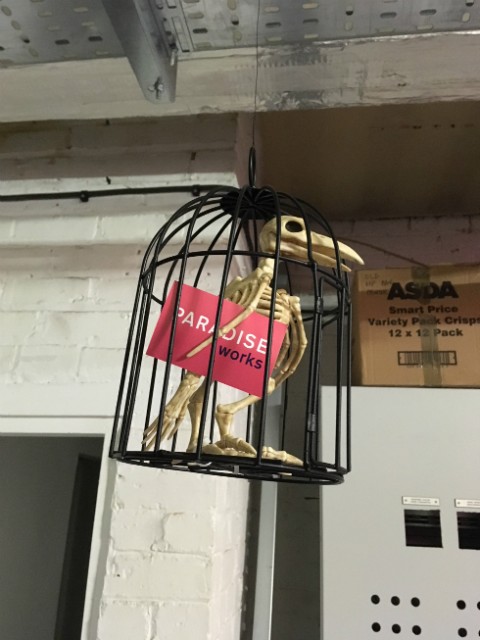
There are also new challenges ahead – like how Jack and co-founder Harvey will maintain their artistic practices and other work commitments, whilst running a busy studio and gallery complex? Harvey also teaches full time at the University of Salford, and is currently being mentored by Ruth Claxon at Eastside Projects, Birmingham, to learn how to juggle roles successfully. Islington Mill founder Bill Campbell has also offered to advise – “He’s keen to support us however he can with all his knowledge from running Islington Mill through thick and thin.” It is clear that they will need some help to take the pressure off day-to-day business logistics – which include stabilising the finances – so that they can concentrate on the vision. But things look bright.
“There’s been a lot of curiosity about what we are doing, and whether Paradise Works would be like other studio groups in Greater Manchester”, continues Jack. “It does feel different to me: for a start, it’s a studio run by women. We’re a community that’s intergenerational, and everyone has chipped in. There’s a new energy around here, and we’ve built it together.”
Laura Robertson
See The Penthouse Present HIVideo by Balaclava.Q, Friday 1 December 2017 at 19:00–22:30 at Paradise Works, Salford
Donation entry: £2 to George House Trust (entry to both HIVideo & Visual Aids screenings). Tickets free from Eventbrite for double screening (booking essential)
All images from the interior of Paradise works, courtesy the author, except third image down, of Hilary Jack at the Paradise Works launch, used with thanks. This article has been commissioned by Paradise Works
Read Jumping Into The Unknown: What Next For Rogue Studios?



